Book contents
- Frontmatter
- Contents
- Preface
- 1 Introduction
- 2 Wave functions
- 3 Linear algebra in Dirac notation
- 4 Physical properties
- 5 Probabilities and physical variables
- 6 Composite systems and tensor products
- 7 Unitary dynamics
- 8 Stochastic histories
- 9 The Born rule
- 10 Consistent histories
- 11 Checking consistency
- 12 Examples of consistent families
- 13 Quantum interference
- 14 Dependent (contextual) events
- 15 Density matrices
- 16 Quantum reasoning
- 17 Measurements I
- 18 Measurements II
- 19 Coins and counterfactuals
- 20 Delayed choice paradox
- 21 Indirect measurement paradox
- 22 Incompatibility paradoxes
- 23 Singlet state correlations
- 24 EPR paradox and Bell inequalities
- 25 Hardy's paradox
- 26 Decoherence and the classical limit
- 27 Quantum theory and reality
- Bibliography
- References
- Index
16 - Quantum reasoning
Published online by Cambridge University Press: 10 December 2009
- Frontmatter
- Contents
- Preface
- 1 Introduction
- 2 Wave functions
- 3 Linear algebra in Dirac notation
- 4 Physical properties
- 5 Probabilities and physical variables
- 6 Composite systems and tensor products
- 7 Unitary dynamics
- 8 Stochastic histories
- 9 The Born rule
- 10 Consistent histories
- 11 Checking consistency
- 12 Examples of consistent families
- 13 Quantum interference
- 14 Dependent (contextual) events
- 15 Density matrices
- 16 Quantum reasoning
- 17 Measurements I
- 18 Measurements II
- 19 Coins and counterfactuals
- 20 Delayed choice paradox
- 21 Indirect measurement paradox
- 22 Incompatibility paradoxes
- 23 Singlet state correlations
- 24 EPR paradox and Bell inequalities
- 25 Hardy's paradox
- 26 Decoherence and the classical limit
- 27 Quantum theory and reality
- Bibliography
- References
- Index
Summary
Some general principles
There are some important differences between quantum and classical reasoning which reflect the different mathematical structure of the two theories. The most precise classical description of a mechanical system is provided by a point in the classical phase space, while the most precise quantum description is a ray or onedimensional subspace of the Hilbert space. This in itself is not an important difference. What is more significant is the fact that two distinct points in a classical phase space represent mutually exclusive properties of the physical system: if one is a true description of the sytem, the other must be false. In quantum theory, on the other hand, properties are mutually exclusive in this sense only if the corresponding projectors are mutually orthogonal. Distinct rays in the Hilbert space need not be orthogonal to each other, and when they are not orthogonal, they do not correspond to mutually exclusive properties. As explained in Sec. 4.6, if the projectors corresponding to the two properties do not commute with one another, and are thus not orthogonal, the properties are (mutually) incompatible. The relationship of incompatibility means that the properties cannot be logically compared, a situation which does not arise in classical physics. The existence of this nonclassical relationship of incompatibility is a direct consequence of assuming (following von Neumann) that the negation of a property corresponds to the orthogonal complement of the corresponding subspace of the Hilbert space; see the discussion in Sec. 4.6.
- Type
- Chapter
- Information
- Consistent Quantum Theory , pp. 216 - 227Publisher: Cambridge University PressPrint publication year: 2001



